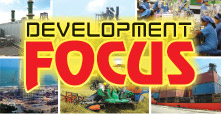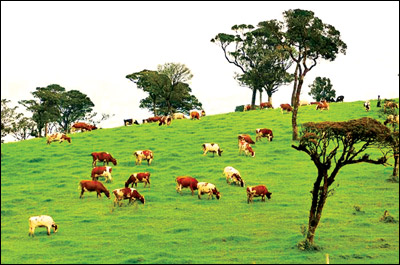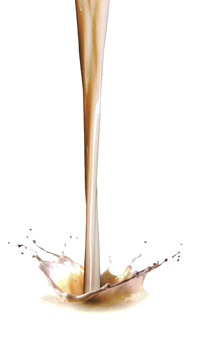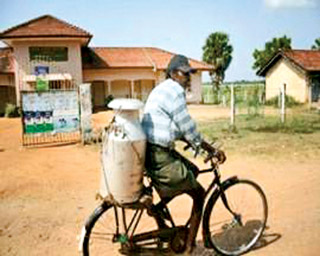 Dairy
production and livestock gets boost Dairy
production and livestock gets boost
Ishara Mudugamuwa
Today it boasts of a
wide network of milk collection centres , production and sales centres
administered throughout the island and continues to contribute towards
the enhancement of the rural economy while providing the much needed
nutrition to the entire nation
The development of the national dairy production and uplifting the
living standards of dairy farmers is one of the main strategies in
Mahinda Chinthanaya policy of President Mahinda Rajapaksa. A dairy
villages program, promotion of the milk production industry,
establishing livestock breeding farms are some of the main programs
currently going on under the Mahinda Chinthanaya.
|

Grazing livestock |
There were 686 dairy villages established since the year 2005 all
over the country. From the year 2007, 450 milk selling centres were
established. It is hoped to increase it up to 1,000 selling centres
before the end of year 2010.
The government has taken steps to revise some acts for the betterment
of livestock. They are Animals Act No : 29 of 1958, Animal Disease Act
No: 59 of 1992, Animal Feed Act No: 15 of 1986 and Veterinary Surgeons
and Practitioners Act No: 46 of 1956.
Animal Production and Health Department, National Livestock
Development Board, Milco Pvt. Ltd. and Sri Lanka-Libya Agricultural and
Livestock(Co.)Ltd and Provincial Departments Animal Production and
Health are five institutions involved in the livestock sector.
An efficient preventive and curative animal health service is
necessary for maintaining a healthy animal population conducive to the
livestock industry and public health.
Other necessary factors: promote optimal utilization of animal
genetic resources; enhance utilization of quality animal feeds and feed
resources; promote and facilitate good animal husbandry practices;
conduct research and development towards a sustainable livestock
industry, develop human resources and ensure efficient and effective
information dissemination and technology transfer; formulate, monitor
and evaluate projects and programs with sector participation; assure
quality of inputs, products, services and practices in the livestock
sector by enforcement of regulatory provisions; ensure efficient
management of departmental activities; goat development programs;
control Bird flu situation; self employment training. These need
 to
be done mainly under the Animal Production and Health Department. to
be done mainly under the Animal Production and Health Department.
They do 5,592,712 vaccinations on animals for various diseases. They
have established five livestock centres in Nuwara Eliya, Matale,
Trincomalee, Ampara and Colombo. The Animal Production and Health
Department has also established a veterinary hospital in Nuwara Eliya.
The National Livestock Development Board was established in 1973 and
is currently doing a great service for the development of the livestock
sector. It is conducting 19 dairy farms, four goat farms, three
hatcheries, two pig farms and two buffalo farms in all over the country.
Milco is the largest and the only government-owned milk producing
company. Milco dairy products are sold in the market under the trade
name of ‘Highland’.
These products are produced using only local milk that is produced by
local dairy farmers. These products are mainly categorized into two
varieties, namely liquid milk and dairy products. Liquid milk such as
pasteurized and sterilized are very natural products and no additives or
chemicals are added to these milk products to extend their shelf life.
Milco Pvt. Ltd. was established in 1955 as The National Milk Board
under the purview of the Ministry of Agriculture. It commenced
operations with a single Factory in Colombo commissioned under the
Colombo Plan.
Today it boasts of a wide network of milk collection centres ,
production and sales centres administered throughout the island and
continues to contribute towards the enhancement of the rural economy
while providing the much needed nutrition to the entire nation.
|

A milk chilling centre in Ampara |
Establishment of Thissapura, Wellaweli and Uppuweli milk chilling
centres, opening of Puttalam and Ambalantota spreading centre,
increasing milk collecting roads from 188 up to 194 and many other
services were implemented in the last three years.
Sri Lanka- Libya Agricultural and Livestock(Co.)Ltd is a joint
partnership company established in 1981 with 51 percent of the shares
owned by the National Livestock Development Board and 49 percent by the
Libyan Arab Jamahiriya to carry on agricultural and livestock projects
in Sri Lanka and to import all necessary inputs and machinery for the
same and export of all forms of agricultural produce and to purchase,
sell, import and otherwise deal in livestock projects including poultry,
meat and eggs.
The company manages a 350-acre coconut farm at Bandirippuwa, Lunuwila
integrated with cattle, sheep and poultry. The company also operates a
poultry breeder stock and a hatchery. Sri Lanka- Libya Agricultural and
Livestock Co. Ltd launched a number of development programs at the cost
of Rs 26 million since year 2008.
|

Livestock farmer |
Under the Uthuru Vasanthaya and Nagenahira Navodaya development
programs the Livestock Development Ministry has started to implement
several projects to uplift the living standards of the people who live
in Northern and Eastern areas. The Ministry provided animals for rearing
and established Dairy Farmers Committees in the Eastern Province. And
also opened two new milk chilling centres in the Trincomalee and
Batticaloa districts.
These chilling centres will help uplift the living standards of 800
resettled dairy farmer families in the Eastern Province and it is
expected to collect 2,500 litres of milk from the Morawewa chilling
centre and 2,000 litres from the Vakarai chilling centre and there are
plans to increase production. It is mentioned in the Mahinda Chinthana
that the President will take all steps to protect the livestock industry
and the livestock farmer. The livestock farmer is a silent person who is
doing a great service for the development of the country. He never talks
to the media and never asks for anything from the Government. Government
imported milk powder at a cost of Rs.19 billion in 2007. Dairy farmer is
the one who helps to reduce it.
Government takes every step to introduce new techniques for livestock
farmers and ensure a good price for their products. |



